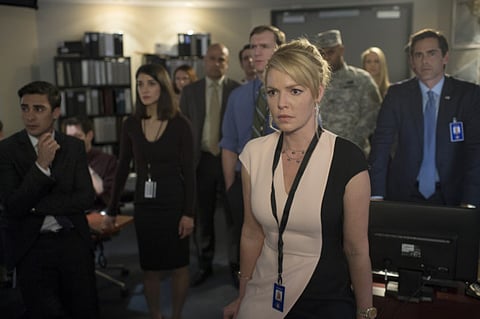Katherine Heigl back in ‘State of Affairs’
Series not as over the top as ‘Scandal’, but it’s still preposterous and at times laughable

Three major broadcast networks now have a series about a high-powered woman in the administration — or near it, since Olivia Pope, the heroine of Scandal, is in and out of the Oval Office as the president’s off-and-on mistress and consultant.
Besides bold, beautiful heroines, these dramas have something else in common, namely hidden, ugly government conspiracies.
Italians have a word, “dietrologia,” for the art of always finding a more sinister explanation behind the official one. And in the age of terrorism, Ebola and legalised marijuana, people may well have grown more paranoid. But dietrologia has become the nicotine of television drama. High-level conspiracies may be banal and unconvincing, but they fuel the craving to watch and see what happens.
State of Affairs, which begins on Tuesday in the UAE, is the latest cabal-minded series, and it looks like a pastiche of the other two.
It stars Katherine Heigl, an alumna of Grey’s Anatomy, as Charleston Tucker, the president’s most trusted national security adviser. The series has some of the sex and high-stepping melodrama of Scandal on ABC, but it’s actually closer in spirit to Madam Secretary, the CBS series that stars Tea Leoni as Elizabeth McCord, a maverick secretary of state who suspects that the death of her predecessor was no accident. Like Elizabeth, Charlie, as Charleston is known, is more enmeshed in current affairs than extramarital ones.
The narrative of State of Affairs is not as outre as the one in Scandal, but it’s still preposterous and at times laughable. That’s not a disqualifier; it’s pretty much a prerequisite for a network action-adventure series. Plausibility isn’t the measure, panache is. The Fox series 24 in its heyday had it. So does Scandal. Now, The Blacklist on NBC has it — mostly because James Spader is the star.
Heigl doesn’t have Spader’s mystique or inimitable knowing air, so the lapses in logic and probability are all the more obvious.
Not that Charlie is easy to pin down. Trying to get over the death of her fiance, who was killed in front of her during a terrorist attack in Afghanistan, Charlie leads a double life — hard-drinking playgirl by night, hard-driving intelligence analyst by day.
A watered-down version of Carrie Mathison from Homeland, Charlie takes a lot of liberties at work as well as play, but gets away with it because of her privileged relationship with President Constance Payton (Alfre Woodard), the mother of her fiance.
Charlie’s therapist tells her that she is repressing what really happened the night her fiance was killed, and, of course, there is more to the story.
Not everything in the show is outlandish; some events are all too realistic. In the pilot, while preparing the president’s intelligence briefing book, Charlie watches a video in which Islamic terrorists slit the throat of a British captive. The masked killers then promise to do the same to another prisoner, an American aid worker. The pilot was filmed before American journalist James Foley was beheaded on camera by the Islamic State last August.
Unfortunately, the nightmares that television writers dream up increasingly anticipate real events — Madam Secretary also had a botched hostage-rescue scenario that was filmed before the public knew about the real-life failed attempt to save Foley.
After Hillary Rodham Clinton lashed out at her critics at a congressional hearing on Benghazi when she was secretary of state, and after Samantha Power became an outspoken ambassador to the United Nations, it wasn’t hard to predict that networks would favour more glamorous, fictional versions.
Pilots aren’t always the best indicator of a show’s trajectory, and State of Affairs could twist toward the campy histrionics of Scandal or follow the more grounded, good-government ethos of Madam Secretary.
Either way, though, the affairs of state on State of Affairs will turn out to be messed up from within.



